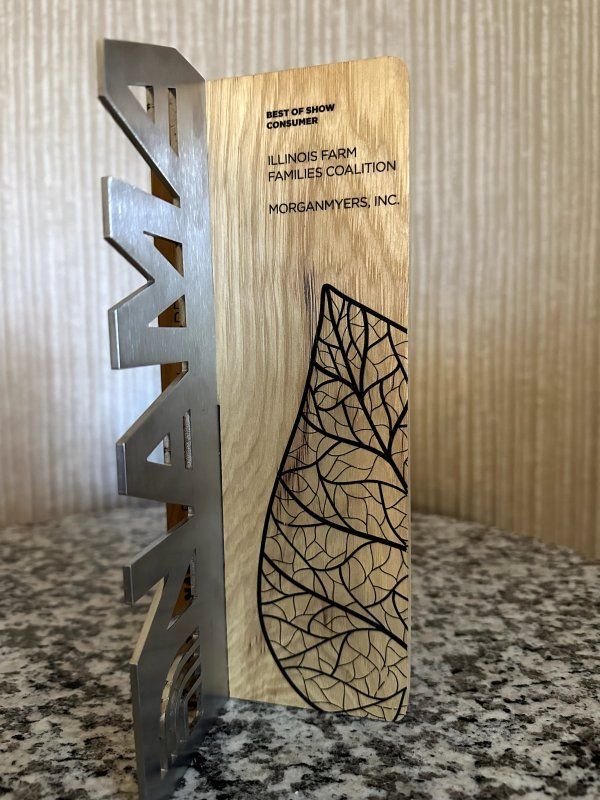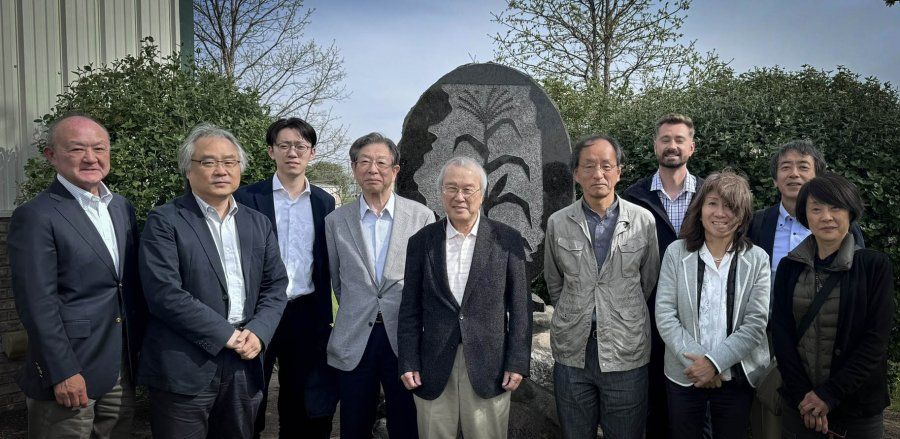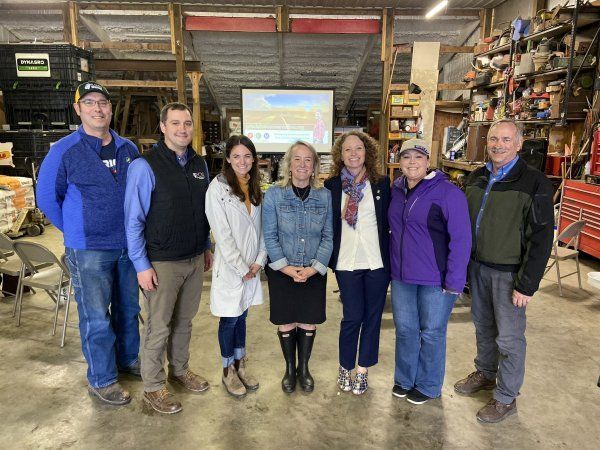Featured Article

April 29, 2024
BLOOMINGTON, Ill. – The Illinois Farm Families (IFF) coalition won a Best of Show award in the consumer category last week at the National Agri-Marketing Association 2024 AgriMarketing Conference in Kansas City. The Best of NAMA awards program honors the best of the best work in ag communications; companies and agencies must first qualify through regional competition to advance to the national level. The Best of Show award was given for a 30-second commercial first aired during the Super Bowl 2023 as the official kickoff of the We Are the 96% campaign produced by IFF. The commercial titled “ The Corporation ,” features Illinois farmer Chad Bell and his family. The video juxtaposes the family farm against a typical corporation, giving Bell’s 7-year-old son the title of “Procurement” and the family dog the position of “Human Resources.” “There’s a big misconception in agriculture that the family farm is gone and everything now is corporate farming and things aren’t the way it used to be,” said Bell, a sixth-generation farmer who, along with his family, raises pigs, corn, soybeans, hay and wheat on their Viola farm. “Yes, farming has changed. Farms have gotten larger and there are fewer farmers, but in the end, the vast majority of farms – 96 percent of farms in Illinois – are still made up of families, even if they look a little different today.” The We Are the 96% campaign featured 25 farm families from across Illinois doing the things that families do – mentoring their kids, teaching new skills, going to work, and coming home – but in a rural Illinois setting. The campaign's goal is to help people not involved in agriculture understand that most farms are run by families that aren’t that different from their own. “We’re very honored to have been part of this campaign,” said Bell. “I’m really happy to be somebody who can help promote Illinois farm families through this campaign and on social media to help others realize that we are the family farm and we’re still alive and kicking.” Bell shares his passion for his everyday life on the farm on Facebook , Instagram , and TikTok . Illinois farmers from six different commodity groups and ag associations pool their dollars to engage with the non-farm audience in Illinois. The We Are the 96% campaign is one example of this important work, but IFF coordinates many other programs in Chicago, hoping to build trust in farmers and their farming practices. “Consumer opinions and impressions of farmers and our entire industry are critical to all the work that we do,” said Jon Rosenstiel, Chairman of the IL Corn Marketing Board. “Corn farmers are contributing checkoff dollars and asking us to invest them in ways that build up our industry and protect it for the future. Helping people who are removed from the farm understand what we are doing and why we are making the decisions we make for our soil and our animals pays dividends in nearly every other program of work we focus on. Congratulations to our IFF partners on this recognition of your hard work.” IFF and the We Are the 96% campaign also won the following Best of NAMA awards: First place - Consumer-facing social media for the We are the 96 social media campaign First place - Consumer-facing ad element category for the “ The Corporation ” TV spot Merit award - Consumer-facing website category for the Wearethe96.org website presence Merit award - Public relations audio/video feature or testimonial category for the We are the 96 behind-the-scenes video IFF thanks our agency partner MorganMyers for bringing the passion and authenticity of Illinois family farmers to life. Illinois Farm Families is a coalition of the Illinois Beef Association, IL Corn, Illinois Farm Bureau, Illinois Pork Producers Association, Illinois Soybean Association, and Midwest Dairy. Their strategic mission is to increase consumer confidence in Illinois farmers and their farming practices by connecting shared values and enhancing understanding of agriculture. The National Agri-Marketing Association is the premier organization for agri-marketing professionals, providing education and insights that position NAMA’s 3,500 members for success and equip them to deliver greater value for their companies and employers in a rapidly changing world. ### About the IL Corn Marketing Board The IL Corn Marketing Board was established in 1982 to manage the voluntary checkoff investment that corn farmers in the state agreed to implement that year. The farmers that serve on the board are elected by their peers to serve unpaid three-year terms. These ICMB farmer leaders strategically invest Illinois corn checkoff dollars to grow demand, create new markets, and foster understanding of corn farmers and the corn industry, which is Illinois’ highest valued agricultural commodity. Find out more about ICMB at www.ilcorn.org and the family farmers who contribute to the checkoff at www.watchusgrow.org.

April 25, 2024
In a partnership between IL Corn and the U.S. Grains Council, 12 members of a Japanese media team toured Illinois this week, beginning in Chicago and traveling through McLean and Piatt County, ending in St. Louis. They marveled at experiencing some of the most fertile soils and farmland on the Earth and focused their study on the overall carbon intensity (CI) score of U.S. corn and corn co-products.

April 25, 2024
Congresswoman Nikki Budzinski visited the Bob and Mark Bunselmeyer Farm in Maroa, IL this week to learn more from Illinois farmers about conservation practice adoption. The visit featured an opportunity for the congresswoman to talk with Precision Conservation Management (PCM) , IL Corn, and PepsiCo , an important PCM partner. To accomplish its sustainability goals, PepsiCo’s approach is to source crops and ingredients in a way that accelerates regenerative agriculture and strengthens farming communities. PepsiCo is one of the first major consumer packaged goods companies to work directly with farmers to create positive environmental change.

April 19, 2024
Upon hearing the U.S. EPA announcement that it will issue a temporary waiver allowing access to lower-cost, lower-emission E15, the IL Corn Growers Association President Dave Rylander from Victoria issued the following statement: “Increased access to higher blends of ethanol is a big win for everyone in Illinois. Of course, I think about corn farmers in Illinois and they will benefit from additional gallons of ethanol sold in our state and nation. However, non-farmers in our state will also feel good about the lower cost of E15 and the smaller environmental impact. “We appreciate the U.S. EPA for issuing this temporary waiver allowing everyone the choice to fill up with E15 or Unleaded 88, a blended fuel of 15 percent ethanol and 85 percent petroleum fuel. “There is a permanent fix for this problem sitting in Congress right now called the Next Generation Fuels Act. The bill permanently fixes this E15 access issue, while also cleaning up our transportation sector by allowing the use of homegrown, renewable fuels. The Next Generation Fuels Act will protect consumer choice to buy the cars you want to buy and have access to the fuels you need, without compromising our country’s greenhouse gas emissions goals. This bill remains a top priority for IL Corn.” ### About the IL Corn Growers Association IL Corn Growers Association is a state-based organization that represents the interests of corn farmers in Illinois, maintaining a high profile on issues in Washington, DC, and Springfield, IL. Through grassroots advocacy, ICGA creates a future for Illinois farmers in which they can operate freely, responsibly, and successfully. In order to fulfill this mission, the organization conducts governmental affairs activities at all levels, market development projects, and educational and member service programs. For further information regarding their work and involvement, visit their website www.ilcorn.org.

April 18, 2024
Plots have thickened. Majorities have shrunk. The knives are out. It’s April in Washington but you would be forgiven for thinking it’s the Ides of March. Much like Julius Caesar, Speaker Mike Johnson (R-La.) is fighting to survive the many political plots against him. In the speaker’s case, the daggers are metaphorical but no less threatening to the established order. As of this writing, there are reports that momentum is growing to oust the speaker because he promised to consider legislation containing military aid for Israel and Ukraine, a move prompted by Iran’s recent missile and drone attacks on the Jewish state, a key American ally. Speaker Johnson, like his predecessor Kevin McCarthy, has struggled to maintain control over a divided GOP House with a narrow majority. The resignations in late March of Reps. Mike Gallagher (R-Wis.) and Ken Buck (R-Colo.) have shrunk that majority even more and made the speaker’s job many times harder. Speaker Johnson has essentially been given a rigged Rubik’s cube. No matter how hard he tries, the colors will never line up. In the midst of this palace intrigue, lay many pieces of legislation that are important to farmers and rural America. We still have a farm bill that is awaiting reauthorization. We have crucial legislation that would provide consumers with access to higher blends of ethanol and pressing trade issues that need to be addressed. I talked in my last column about the work we are doing in Washington to keep these priorities on track through meetings with policymakers, public relations campaigns, etc. But if we are going to make an impact this year, we are going to have to do so on the ground level. After all, all politics are local. We need our farmers to continue to beat the drum at town hall meetings and through letters to Congress, encouraging action on our key priorities. (If you have not done so, please sign up for action alerts by texting “COB” to 52886.) I have written in the past about some of the issues that drive divisions in Washington, including the fact that policymakers are spending less time in the city building relationships and the growing distaste across the country for bipartisanship. But bipartisanship has delivered over and over again for the American farmer. While many of the issues plaguing Washington are beyond our control, our farmers can work this election year to ensure that the people they send to Washington come here to work for them and not just to promote their own parochial interests. Farmers can also show up at campaign events and speak up about issues of importance to the agricultural community. Campaign rallies and meet and greets are perfect venues for talking about everything from the farm bill to the Next Generation Fuels Act. But above all, we should take these opportunities to tell candidates that we want to see action on our issues. Politics have been brutal since the dawn of time, no less evidenced by the demise of Julius Caesar. But I still have hope because there is one thing we have that Rome lacked: The American farmer. Et tu, America? Appleton is the vice president of public policy at the National Corn Growers Association.

April 8, 2024
Season 2: Episode 2 IL Corn TV recently interviewed Terry Johnston of Farm Rescue. Terry talked about how Farm Rescue helps families in crisis. Family farms are the heart of our food & fuel system, but one bad break can put everything at risk. Imagine a family farm struggling to stay afloat. Maybe a flood wiped out their crops, or a tornado takes out their equipment. Farm Rescue is their lifeline. Farm Rescue give them the help they need to get back on their feet. Subscribe to IL Corn's YouTube channel for alerts on new episodes.

April 4, 2024
In an International Trade Commission (ITC) hearing today, National Corn Growers Association (NCGA) President Harold Wolle discouraged the agency from placing tariffs on the imported herbicide 2, 4-D. In March, Corteva Inc. filed antidumping and countervailing duty tariffs petitions with concerns over India and China’s trade practices. If approved the duties would limit access to 2, 4-D and increase herbicide prices for American farmers. “The scenario under consideration has the potential to limit imports of an important product, raise its price, and create a supply shortage, all while raising the cost of production in an already tight market,” Wolle said. “In the last few years, input prices have skyrocketed,” IL Corn Growers Association President Dave Rylander said. “Our Illinois farmers cannot take another hit on this front, especially with current commodity prices.” Corn prices have decreased by over 40% in the last two years. Additionally, the United States Department of Agriculture (USDA) Economic Research Service forecasts farm net income in 2024 at $116.1 billion, a 37% drop from $185.5 in 2022. 2, 4-D is a popular herbicide for corn and soybean and has been used in agriculture since the 1940s. Reiterating the importance of market diversity and competition, Wolle said tariffs would be detrimental to American agriculture and the nation’s food supply. “Thousands of farmers simply cannot rely upon a sole domestic supplier of 2, 4-D acid to meet nearly all of the market’s 2, 4D needs,” he said. “That will undoubtedly lead to shortages and delays in an industry that needs this product, and that must have timely delivery.” Within the next 45 days, the ITC will determine if there is a reasonable indication that the imports are injuring or threatening to injure the U.S. industry. If the ITC finds that this standard met, the cases will move to the Department of Commerce, which will calculate the preliminary anti-dumping and countervailing duty margins.
Articles
2026
2025
2024
2023
2022
2021
2020

